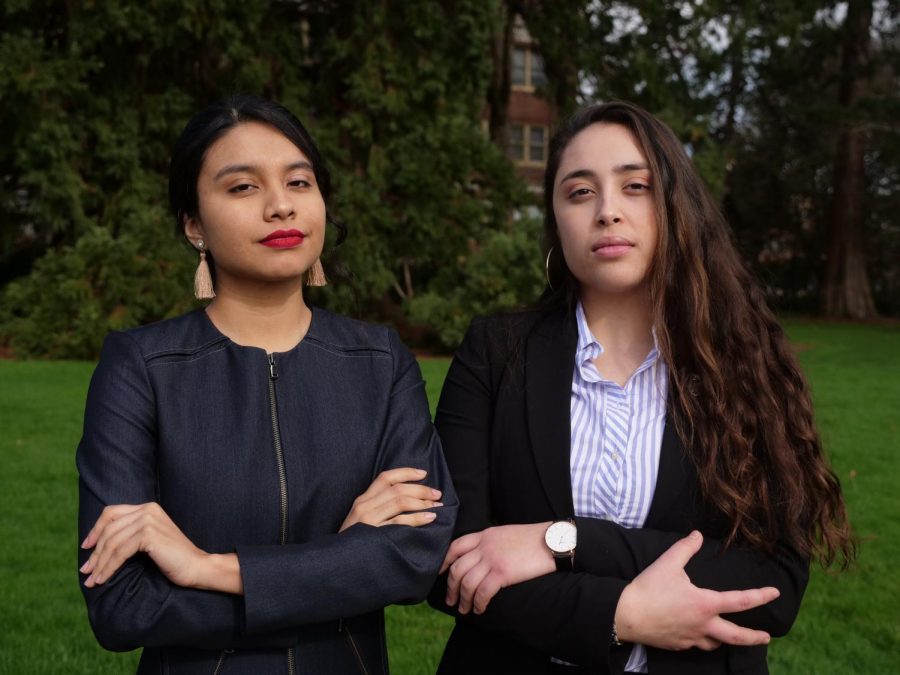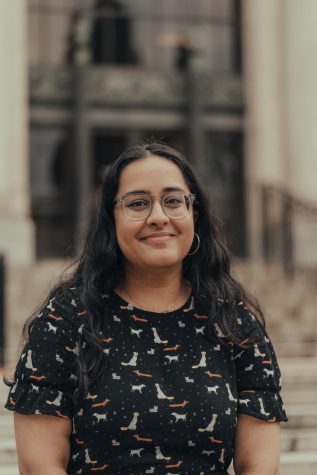ASOSU forms special committee following allegations of misconduct against president and vice-president; questions regarding racism, misogyny arise
March 19, 2021
A special committee has been formed by the House of Representatives in the Associated Students of Oregon State University to investigate allegations of misconduct regarding ASOSU President Isabel Nuñez Pérez and Vice-President Metzin Rodriguez.
This special committee was created through the passing of House Bill 12.02, the Executive Conduct and Accountability Bill, which was proposed at the House of Representatives meeting on Wednesday, Mar. 10 at 6 p.m.
ASOSU Speaker of the House Chase Pettibone said via email that there are numerous accusations against the president and vice-president, including negligence, statutory faults and general failures in leadership.
The bill states that examples of the president and vice-president’s misconduct may include, but are not limited to: negligence, failure to provide oversight and accountability of Executive staff, failure to provide clear direction for the ASOSU organization and failure to communicate effectively with the ASOSU Congress.
Pettibone said the bill was approved unanimously by the House of Representatives.
“The Executive Conduct and Accountability committee will undergo an investigation where they will interview staff from the Executive Branch as well as some other senior leadership,” Pettibone said in an email. “The committee is currently set to present its findings by week three [of spring term], and at such time a report and recommendation will be made to the ASOSU Congress.”
The bill was authored by Joseph K. Page, an ASOSU representative. In addition to Page, the bill was sponsored by Matteo Paola, Kathy Hu, Bailey Langley, Griffin Scott and Madeleine Seifert; all of whom are also ASOSU representatives.
Nuñez Pérez and Rodriguez said they did not see this bill coming as they are an open book with peers and colleagues, constantly making themselves available to everyone in the ASOSU.
“We see this perhaps as an issue of communication in a worldwide pandemic,” Nuñez Pérez and Rodriguez said in an email. “The concerns that were brought up in the House of Representatives Bill 12.02 that formed the special committee could have been talked through, peer to peer, in a meeting with us or with a third-party present or with mediation. While we acknowledge that this is a procedural matter based on the ASOSU constitution and statutes, we are very hurt and at a loss for words because members of Congress chose to take this formal course of action rather than just meeting with us and resolving this matter informally.”
Nuñez Pérez and Rodriguez said the first time they heard about House Bill 12.02 was hours before it was presented at the Wednesday House of Representatives meeting, and said that they do not agree with the allegations listed in the bill.
“We firmly believe that we have served the student body to the best of our ability, given the circumstances,” Nuñez Pérez and Rodriguez said. “We’ve always made ourselves available to everyone in the ASOSU and have been there for anyone who has needed us. We ran as DAMUnited by students FOR STUDENTS and have continued to put in the work to do so.”
In regards to why members of the ASOSU believe their leadership needs to be investigated, Nuñez Pérez and Rodriguez said they are not sure.
“It might be because of a difference in leadership style or miscommunication,” Nuñez Pérez and Rodriguez said. “However, as leaders we’ve tried our best to support members of the ASOSU and our student body. For the last 10 months we’ve worked tremendously hard and navigated very difficult and emotionally challenging situations. We are also not perfect but whenever we make a mistake we own it and take it as a learning opportunity to improve.”
At least one member of the ASOSU believes the way the bill was introduced is concerning and suspicious because the officers are women of color.
This member, Nat Young, an ASOSU senator, said via email the bill was proposed and voted on without consultation with the Oversight and Ethics Committee or the Judicial Council because the author and sponsors of the bill were concerned about the time it would take representatives to decide on disciplinary action if necessary. With the incoming president-elect and vice-president-elect taking their post at the end of spring term, Nuñez Pérez and Rodriguez can only be investigated until their presidential term ends on May 31, 2021.
Though Young said that the bill has female sponsors and sponsors from underrepresented groups, she questioned the way the bill was proposed and targeted.
“Because the bill was not presented to the Oversight and Ethics Committee, which is composed of a woman from an underrepresented group and a trans non-binary person who is [of] a religious minority, nor was the bill introduced as a Joint Bill—thus needing to pass through both houses of Congress, with the Senate being the more diverse of the two houses, there were notable concerns that this move was targeted,” Young said. “I will note that to my knowledge there seems to be a stark difference in scrutiny and standards when the leaders are women from underrepresented groups. Where was this committee when former President Simon Brundage oversaw a congress that contained Andrew Oswalt, a known white supremacist charged with hate crimes?”
However, Young noted women and students from underrepresented groups are serving on the newly-elected committee to investigate the president and vice-president’s conduct.
“After an emergency ad-hoc meeting was held this past Friday morning, those in attendance were assured by the bill author and one of its sponsors that the committee and its findings will be transparent and democratic,” Young said. “Those in attendance were also assured that the primary purpose of the committee is not to seek punitive action; it is to determine what is a sound and concerning allegation and what is hearsay.”
Pettibone said that though he does not speak for all of ASOSU, the organization has had an unfortunate history with women of color.
“The bill itself establishes an investigative committee to determine if such aforementioned allegations are factual or simply baseless claims,” Pettibone said. “Allegations of racism and misogyny are serious accusations which the ASOSU Congress does not take lightly. The ASOSU Congress has reviewed the motives behind the bill, which included a three hour conversation within the House of Representatives, and, at this time have determined that the allegations do not exhibit racial or misogynistic motives.”
Pettibone emphasized the impacts of COVID-19 on the ASOSU, as all of their work has been done remotely.
“The committee has been made up of a diverse and passionate group of students who are simply making an accountability check, as is Congress’ prerogative,” Pettibone said. “It’s been a difficult year for all.”
The ASOSU Advising Team, which includes the Associate Dean of Students Leslie Schacht Drey, the Coordinator for Student Governance Sharanda Norman and Graduate Assistant Rachel Navratil, said they are aware of concerns regarding racism and misogyny in the bill.
“We acknowledge that some students may experience this as possible racism and misogyny,” a statement from the team said. “We encourage all students to seek support and resources for any concerns, such as assistance from the university’s Bias Response Team and the Office of Equal Opportunity and Access.”
The Advising Team noted the ASOSU president and vice-president continue to have the authority to conduct their duties per the ASOSU’s constitution and statutes.
Nuñez Pérez and Rodriguez agreed with Young’s initial claim that the bill has undertones of racism and misogyny.
“Institutions like [OSU] and the ASOSU were not built for people like us,” Nuñez Pérez and Rodriguez said. “Women of color, first-generation, immigrant. There is a long history of women of color being pushed out of the ASOSU. This is a pattern that is perpetrated by the systems actively in place. ASOSU has the bad reputation of being an elitist, male-dominated and white space as well as [having] a poor relationship with cultural organizations for the reasons stated above.”
Nuñez Pérez said she thinks it’s important for the community to understand that this isn’t the first time the leadership of women of color has been questioned within the ASOSU.
“If nothing changes, then this will keep on happening due to the nature of how the organization is structured,” Nuñez Pérez said. “This is not an anti-racist organization, as we have tried to shift the culture in ASOSU and this is where it has led.”
Rodriguez said representation at the table and leadership can come with a price.
“Since day one at OSU and ASOSU, as our platforms say, we have been centered around accountability, community advocacy and transparency,” Rodriguez said. “Unfortunately, these systems weren’t created for someone who looks like us. I hope no injustices are made in this process of accountability.”
Nuñez Pérez and Rodriguez referred to a quote that former ASOSU president M. Tonga Hopoi said at her impeachment trial: “As leaders, what kind of community do you want to be? What kind of OSU community do you want?”
In 2011, Hopoi, a woman of color, became the first ASOSU president to be impeached. She was charged with violating her executive duties in her dealings with the Oregon Student Association and failing to communicate with her peers.
To the best of the ASOSU Advising Team’s knowledge, the only other impeachment trial was in 2015, for former ASOSU President Cassie Huber. The trial found Huber not guilty for charges that included misuse of ASOSU funds and a vehicle, as well as violations of the ASOSU constitution.
In the last ten years, Hopoi remains the only impeached ASOSU president.


















































































![Newspaper clipping from February 25, 1970 in the Daily Barometer showing an article written by Bob Allen, past Barometer Editor. This article was written to spotlight both the student body’s lack of participation with student government at the time in conjunction with their class representatives response. [It’s important to note ASOSU was not structured identically to today’s standards, likely having a president on behalf of each class work together as one entity as opposed to one president representing all classes.]](https://dailybaro.orangemedianetwork.com/wp-content/uploads/2025/03/Screenshot-2025-03-12-1.00.42-PM-e1741811160853.png)
























